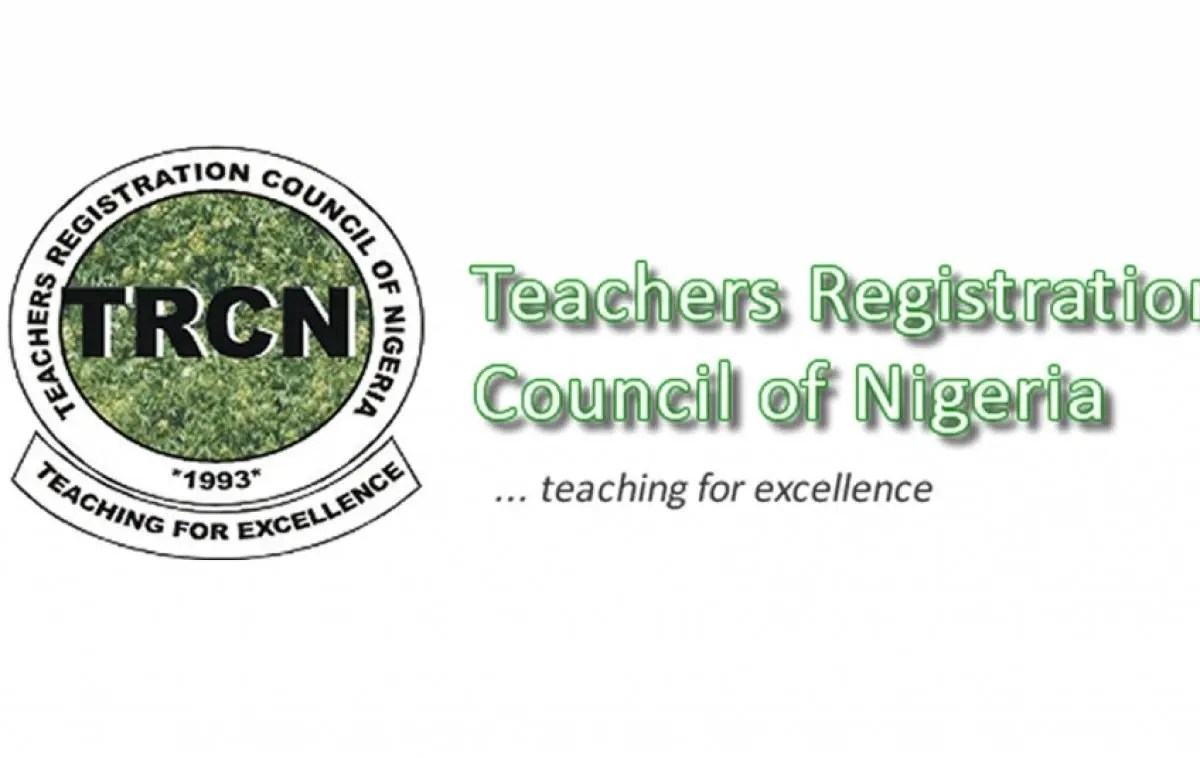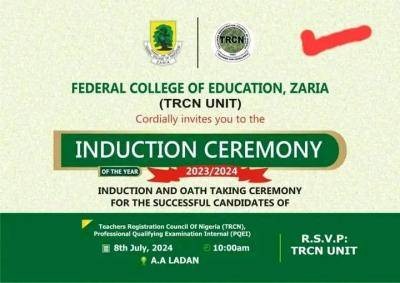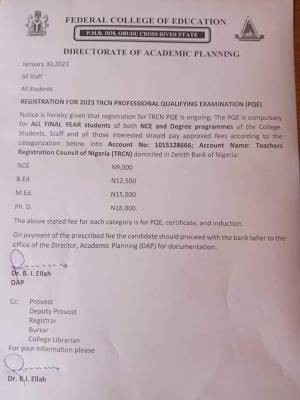
The Teachers Registration Council of Nigeria (TRCN) was established by Decree (now Act) 31 of 1993. Several decades of agitation by professional teachers and other stakeholders for the establishment of a regulatory agency led to the enactment of the Act.
The Act in section 1(1) charged the Council with the following responsibilities:
- Determining who are teachers for the purpose of this
- Determining what standards of knowledge and skills are to be attained by persons seeking to become registered as teachers under this Act and raising those standards from time to time as circumstances may
- Securing in accordance with the provisions of this Act the establishment and maintenance of a register of teachers and the publication from time to time of the lists of those
- Regulating and controlling the teaching profession in all its aspects and ramifications.
- Classifying from time to time members of the teaching profession according to their level of training and
- Performing through the Council established under this Act the functions conferred on it by this
Functions Duties and Responsibilities of TRCN
In accordance with the TRCN legal provisions and conventions common to the professional regulatory agencies, the Council is systematically implementing the following functions:
- Registration and licensing of qualified teachers
- Accreditation, monitoring and supervision of the courses and programmes of teacher training institutions in Nigeria to ensure that they meet national and international standards. The institutions include the Colleges of Education, Faculties and Institutes of Education in Nigerian universities, Schools of Education in the Polytechnics, and the National Teachers Institutes.
- Organisation of Internship Schemes and induction programmes for fresh Education graduates to equip them with the necessary professional skills before licensing them for full professional practice.
- Conduct of professional examinations and interviews to determine teachers that are suitable for registration.
- Establishment of national minimum standards for and execution of Mandatory Continuing Professional Development (MCPD) to guarantee that teachers keep abreast of developments in the theory and practice of the profession.
- Organisation of Annual Conference of Registered Teachers (which is the first of its kind in Nigeria) intended to unite all teachers irrespective of social class or the level of education system to which they belong.
- Publication of a register of qualified and licensed teachers in Nigeria in hard copies and available through the World Wide Web.
- Enforcement of professional ethics among teachers using the Teachers Investigating Panel (TIP) and the Teachers Tribunal.
- Prosecution in the law court of unqualified persons performing the job of teachers in contravention of the TRCN Act section 17(2).
- Acting as the voice of the voiceless teachers and continuously initiating/driving public policies and practices that could reposition the teaching profession in Nigeria as first among equals.
HOW TEACHERS REGISTRATION COUNCIL OF NIGERIA STARTED
The Council became operational by June 2000 with the appointment of a pioneer Registrar/Chief Executive in the person of Chief Anjikwi Musa Ciwar (OON) by the President and Commander-in-Chief of the Armed Forces of Nigeria. By 2008 when the pioneer Registrar/Chief Executive retired, the Council had recorded unprecedented success in institutionalizing itself as a national organization. It attracted a core of motivated and technically efficient staff from diverse sectors of the economy and the education system. All states of the Federation including the Federal Capital Territory had a fair share of this core of staff as their indigenes. Similarly the Council opened offices in all 36 states and the Federal Capital Territory. The Council also has twelve state-of-the- art zonal offices, two in each geo-political zone of the country.
The quick spread of the Council across the country was made possible by the overwhelming support received from the Executive Governors of the various states, together with their Ministries and parastatals of Education, the Nigeria Union of Teachers, the Vice Chancellors of universities, Rectors of polytechnics, Provosts of Colleges of Education, and other stakeholders. Indeed, most of the state and some zonal offices were donated and furnished by the State Governments to demonstrate their support for the professionalism of teaching in Nigeria.
Over 700,000 (seven hundred thousand) teachers had been registered. The registration cuts across all levels of the education system- primary, secondary and tertiary – in the public as well as private educational institutions. The registration covered over 80 % of teachers in the public primary and secondary schools in the country, some teachers in the private schools, some teachers in polytechnics, many lecturers and professors from the universities, and many teachers in administrative positions in the education system including Directors of Education, Permanent Secretaries, Honorable Commissioners and Ministers of Education, Vice Chancellors, Governors and veteran teachers.
The Council also registered many Nigerians abroad who applied for registration because the foreign countries like Britain, Australia, Canada, and United States of America required evidence of registration with TRCN before registering them as teachers.
TRCN: Restoring the lost glory of the teaching profession in Nigeria!
STRATEGIC PARTNERS of TRCN
In strategizing to accomplish its programmes and activities, the Council regularly interacts with the following stakeholders, among others:
- Honorable Minster(s) of education.
- Federal Ministry of Education and its parastatals and
- National Council on Education, which is the highest decision making body on Education in
- Executive Governors of the various states of the
- Honourable Commissioners of Education of the
- State Ministries of Education and their parastatals (SUBEB, SEMB, TESCOM, etc).
- Senate and House Committees on Education in the National
- Vice chancellors of universities, Rectors of polytechnics, and Provosts of Colleges of
- Deans of Faculties and Directors of Institutes of Education in the
- Nigerian Academy of Education
- Teachers unions and associations – NUT, COEASU, ANCOPSS, STAN, COPSHON, etc.
- National Association of Proprietors of Private
- The media.
- Regulatory agencies of other professions – Council of Legal Education of Nigeria, Medical and Dental Council of Nigeria, Pharmacists Council of Nigeria, Council for the Regulation of Engineering in Nigeria,
- Teacher Regulatory agencies abroad – Britain, Canada, USA, Australia, South Africa,
- Development partners – World Bank, British Council, UNESCO, ILO, USAID, COMPASS, ENHANSE, DFID, JICA,
- Civil society organizations particularly CSACEFA and many other stakeholders.
TRCN ORGANISATIONAL STRUCTURE
As an agency of the Federal Government, TRCN in administrative terms is structured much the same way as the other related organs of Government. It has a hierarchical authority structure that runs from the President and Commander in Chief of the Armed forces of Nigeria, through the Honourable Minister of Education down to the Governing Board and Management.
As provided in the Nigerian Constitution and the TRCN Act, the President of Nigeria appoints the Registrar/Chief Executive of TRCN and constitutes the TRCN Governing Board in the best interest of the country. He further makes the final decision on all matters that, according to extant national regulations, fall beyond the jurisdiction of the Governing Board and the Honorable Minister of Education.
TRCN GOVERNING BOARD
The Board is the policy making arm, which regulates the vision, mission, goals and targets to be pursued by TRCN. It checks and balances the activities of Management and reserves the right to approve or disapprove significant undertakings by TRCN. The TRCN Act also provided for a broad-based governing board which ensures that all relevant stakeholders in the teaching profession are adequately represented. Few other agencies have such wide spectrum of representation and large membership. Below is the list of membership as provided by the law:
a) Chairman
b) Representatives of each of the committees of:
i) Deans of Education and Directors of Institutes of Education in Nigerian universities
ii) Provosts of Colleges of Education
iii) Rectors of polytechnics
c) One person representing each of the following bodies:
i) National Universities Commission (NUC).
ii) National Commission for Colleges of Education (NCCE)
iii) National Board for Technical Education (NBTE).
iv) National Teachers Institute (NTI).
d) A Representative of the Federal Ministry of Education (FME).
e) Six (6) persons representing the State Ministries of Education (SMOE). They will be elected in rotation among the various states of the Federation and be appointed for a term of two years by the Federal Ministry of
f) Two (2) persons representing the Nigerian Academy of Education (NAE).
g) Five (5) persons elected by the Nigerian Union of Teachers (NUT).
h) The Registrar of the Teachers Registration Council of Nigeria.
DEPARTMENTS OF TRCN
TRCN operates four departments to maintain a lean, fast-paced and pragmatic structure that can meet its daunting challenges. These are:
- Office of the Registrar/Chief Executive: This has four units as follows:
- Internal Audit
- Information
- Legal Unit
- Servicom
- Department of Administration and Finance: Has five units as follows:
- Establishment/Council Secretariat
- Staff Welfare/ General Services
- Funds Management
- Expenditure Control and Final Accounts
- Budget and Budgetary Control
- Department of Professional Operations: This Department has Divisions as follows:
- Field Operations
- Registration and Documentation
- Certification and Licensing
- Education and Accreditation
- Professional Regulations and Special Duties
The Department of Professional Operations further controls all 36 State and 12 Zonal Offices of the
- Department of Planning Research and Statistics: Has four Divisions:
- Planning
- Research and Statistics
- Library and Publication
- Computer services
TRCN ZONAL OFFICES NATIONWIDE
For purposes of elaboration, the following are the locations of 12 TRCN Zonal Offices (two for each geopolitical area) and states under them:
- Minna – Niger, Kwara and Kogi States
- Kaduna – Kaduna, Kano, Katsina, and Jigawa States
- Sokoto – Sokoto, Kebbi and Zamfara States
- Maiduguri – Borno, Bauchi and Yobe States
- Yola – Adamawa, Taraba and Gombe States
- Jos – Plateau, Benue and Nasarawa States
- Enugu – Enugu, anmbra and Ebonyi States
- Owerri – Imo and Abia States
- Uyo – Akwa Ibom, Cross River and Rivers States
- Benin – Edo, Delta and Bayelsa States
- Akure – Ondo, Ekiti and Osun States
- Lagos – Oyo, Ogun and Lagos
MANDATORY REGISTRATION PRIOR TO PRACTICE
As obtains in the other noble professions, the law makes it an offence for any one to engage in teaching without registration. This is clearly spelt out in section 17(2) of the TRCN Act which states that:
If on or after the commencement of the Act, any person not being a registered member of the profession or in expectation of reward, takes or uses any name, title, addition or description implying that he is in practice as a registered member of the profession, he shall be guilty of an offence.
The Act further states that employers and other officials who aid and abet the employment of unqualified/unregistered teachers are themselves guilty of the same offence and shall receive same punishment. This is made clear in section 17(6) of the Act as follows:
Where an offence under this section which has been committed by a body corporate is proved to have been committed with the consent or connivance of, or to be attributable to any neglect on the part of any director, manager, secretary or other similar officers of the body corporate or any person purporting to act in such capacity, he as well as the body corporate shall be deemed to be guilty of that offence and shall be liable to be proceeded against and punished accordingly.
The Act stipulates that the punishment shall be a fine of N5,000 (five thousand Naira) or two years jail term or both.
TRCN REGISTRATION REQUIREMENTS
To be registered as a professional teacher, a person must possess a teaching qualification not lower in standards than the NIGERIA CERTIFICATE IN EDUCATION (NCE). This is the minimum standard stipulated by the National Policy on Education. Holders of Teachers Grade Two with effect from 2006 are no longer being registered. The grace period given in consideration of the thousands of teachers in this category already in the education system, which allowed for the registration of such teachers in the past years, has expired. However, all Teacher Grade Two Certificate holders undergoing the STUP programme who were earlier registered by TRCN are condoned and will at the successful completion of the programme be issued with the standard teachers registration certificate at no extra registration fee.
The other acceptable qualifications are degrees in Education (B. Sc Ed; B. Ed; M. Ed; PhD). Those with degrees/Diplomas in non-Education fields must possess Post Graduate Diploma in Education (PGDE) or Professional Diploma in Education (PDE). The Technical Teachers Certificate (TTC) acquired not later than 2008 is also valid but from 2009 the PDE will replace the TTC totally.
INSTITUTIONS IN NIGERIA OFFERING APPROVED PROFESSIONAL TRAINING IN EDUCATION
The institutions currently are:
- National Teachers Institute (NTI)
- Colleges and Universities of Education
- Institutes of Education in the universities
- Faculties of Education in the universities
- Schools or Departments of Education in the polytechnics
- Any other institution that may be approved by government from time to time
- Foreign countries with recognized educational training.
TEACHER CATEGORIES AND CURRENT REGISTRATION FEES
The category and cost are based on an individual’s qualification:
| CATEGORY | QUALIFICATION | REGISTRATION FEES | ANNUAL DUES |
| A | PhD + Educ. | N10,000 | N5,000 |
| B | Masters + Educ. | N8,000 | N4,000 |
| C | Bachelors/HND + Educ. | N6,000 | N3,000 |
| D | NCE | 3,000 | N2,000 |
BENEFITS OF PROFESSIONALISATION OF TEACHING IN NIGERIA
The TRCN Act is the greatest gift bequeathed to the Nigerian teachers by government. This is for the fact that to all wise and noble vocations the rule is, “seek first professionalism and every other desirables will be added unto you”.
Professionalism is the most primary and fundamental need of any vocation that wishes to deliver qualitative services to society and have its members well respected and remunerated. It ensures that only those that are appropriately trained and inducted perform the job. It guarantees that ethics are imbibed, the rules of the game exist and are obeyed by all, clients get value for their money and efforts, public interest is protected, priority is given to nation-building, and above all, that the professionals are regarded with dignity and awe. The professions of Law, Medicine, Engineering, Pharmacy, Accountants, etc realized these secrets early enough and fully exploited them. That is why most people today would like to belong to these other professions.
However, the government has now given the teaching profession the greatest empowerment ever to match the performance and social worth of their counterparts in other professions. They should be proud that at the end, Government has recognized and put into law the fact that only the trained individual can teach. It is a thing of joy and pride to any real teacher. It should also be a thing of joy to parents in this country who have been groaning under the weight of poor quality education, examination malpractices, cultism, and sundry vices most of which are the impact of the invasion of the education system by persons neither trained nor genuinely interested in teaching as a career.




